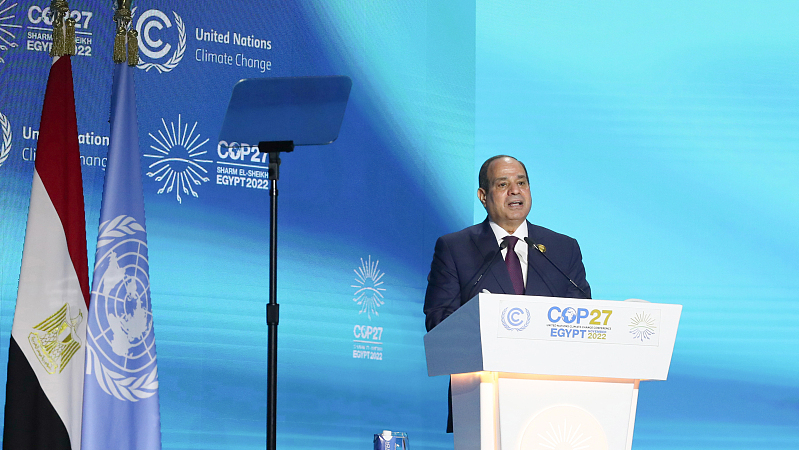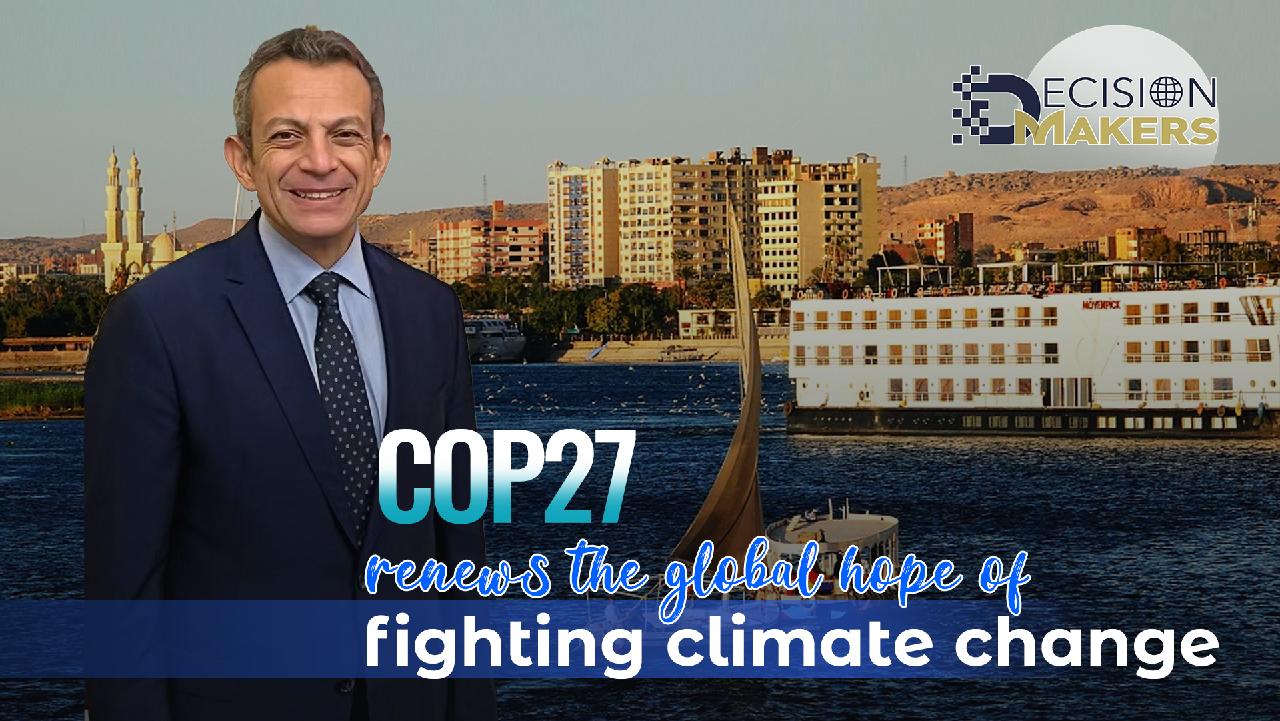Editor’s note: Decision Makers is a global platform for decision makers to share their insights into the events shaping the world today. Assem Hanafi is the Ambassador of the Arab Republic of Egypt to China. The article reflects the views of the author and not necessarily those of CGTN.
The city of Sharm el-Sheikh, Egypt is currently hosting the 27th Conference of the Parties to the United Nations Framework Convention on Climate Change (COP27) and a plethora of climate-related events, where Egypt demonstrates its belief the need for urgent action on the climate crisis and the importance of moving quickly and urgently from negotiations and planning to implementation and concrete action.
Egypt’s vision for COP27 can be described by what Egyptian Foreign Minister and COP27 President-elect Sameh Shoukry said: “We need to accelerate climate action on all fronts, including mitigation, adaptation and financing, in addition to adopting more ambitious mitigation measures to keep the temperature of 1.5 degrees Celsius within reach. There can be no delay in meeting climate commitments or reversing hard-won gains in the global fight against climate change. We need to work together for implementation. We must act, and act now, to save lives and livelihoods.” Moreover, Egypt believes that to enhance the quality of climate action, current geopolitical challenges should not impede efforts and actions. joint international communities.
In July 2022, Egypt updated its Nationally Determined Contributions (NDCs), on the directives of Egyptian President Abdel Fattah Al Sisi, in which it announced its emission reduction targets for 2030, where it commits to reducing its greenhouse gas (GHG) emissions in the electricity generation, transmission and distribution sector by 33%. To achieve this goal, Egypt intends to accelerate the scaling up of renewables on the grid by reducing coal capacity and replacing inefficient thermal plants. As for the oil and gas sector, Egypt pledges to reduce its emissions by 65% in 2030 by expanding the network of gas pipelines to help households switch to cleaner fuels.
For the transport sector, Egypt plans a 7% reduction in emissions and plans to promote the fossil fuel-efficient modal shift from private passenger and freight vehicles to public transport through the expansion of the Cairo underground network, the development of the Alexandria metro, the development of several rail lines, the transformation of public buses to run on low-carbon fuels (i.e. natural gas) and the greening of the civil aviation sector through the introduction of 2% biofuels for aircraft, which was used for the first time to operate an EgyptAir flight carrying a delegation attending COP27. In addition, Egypt has expanded the construction of wind power plants, as well as solar parks, as evidenced by the construction of the “Benban” solar park, one of the largest solar power plants in the world.
However, for Egypt and most developing countries to achieve their NDCs and succeed in tackling climate change, it is crucial to have an adequate and predictable climate finance model. To this end, Egypt calls for increased transparency of financial flows and facilitated access to meet the needs of developing countries, particularly those in Africa, least developed countries (LDCs) and small island states in development (SIDS).

Egyptian President Abdel Fattah Al Sisi speaks at COP27, Sharm El Sheikh, Egypt, November 7, 2022. /CFP
Egyptian President Abdel Fattah Al Sisi speaks at COP27, Sharm El Sheikh, Egypt, November 7, 2022. /CFP
In fact, a report commissioned by current and previous climate summit hosts, Egypt and Britain, was released ahead of discussions on climate change financing at COP27. He said “the world needs a breakthrough and a new climate finance roadmap that can mobilize the $1 trillion in external finance that will be needed by 2030 for emerging markets and countries. in development”.
The report also pointed out that the majority of the increase in financing is expected to come from the private sector, both domestic and foreign, while annual flows from development banks are expected to be tripled. Concessional loans for environmental purposes, which offer more favorable conditions than markets, should also be reinforced. The report also calls on governments in developed countries to double their grants and low-interest loans to developing countries from $30 billion a year to $60 billion by 2025.
COP27 is also a demonstration of the strong cooperation between Egypt and China. There is a common vision between the two countries on the need to continue the global effort to mitigate the impacts of climate change. This is clear from the latest report on China’s policies and actions on climate change, in which the Chinese government repeatedly calls on developed countries to meet existing commitments, especially in the areas of financing and adaptation, as well as the report of the 20th National Congress of the Communist Party of China, presented by Xi Jinping, which stressed the need to protect the environment, combat climate change and accelerate the transformation of the green economy. This has also been clearly demonstrated with the success of the Chinese authorities in drastically reducing air pollution levels in the city of Beijing.
As a partner in multi-billion dollar green projects, China is working hand in hand with Egypt on important projects, including Egypt’s first light rail, the first electric bus, as well as investments in Egyptian solar parks. It is important to mention that the fight against climate change requires collective efforts and continuous dialogue between all stakeholders, both developing and developed countries. In addition, the high-level cooperation between China and the Egyptian COP27 Presidency continues to strengthen and assumes a crucial role in the coming months.
There is reason to hope, this year’s conference will add further milestones to the positive steps underway towards climate action that cannot be overlooked, such as the development of technology and satellite imagery that will make it possible to monitor any climate change with greater precision, and strengthen our resilience in the fields of agriculture and the fight against desertification, in addition to the existence of early warning systems that offer protection against the conditions extreme weather. Another source of optimism is the ascendancy of climate and environmental science research, access to global policy makers with declining climate change deniers, and the remarkable increase in youth engagement in climate awareness and action.
(If you would like to contribute and have specific expertise, please contact us at [email protected]. Follow @thouse_opinions Twitter for the latest comments in CGTN’s Opinion section.)




